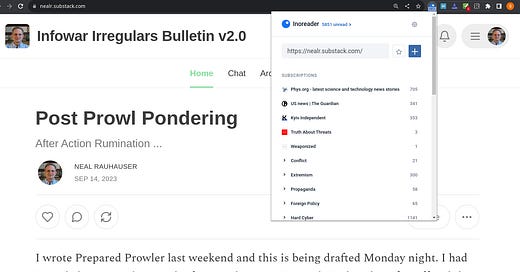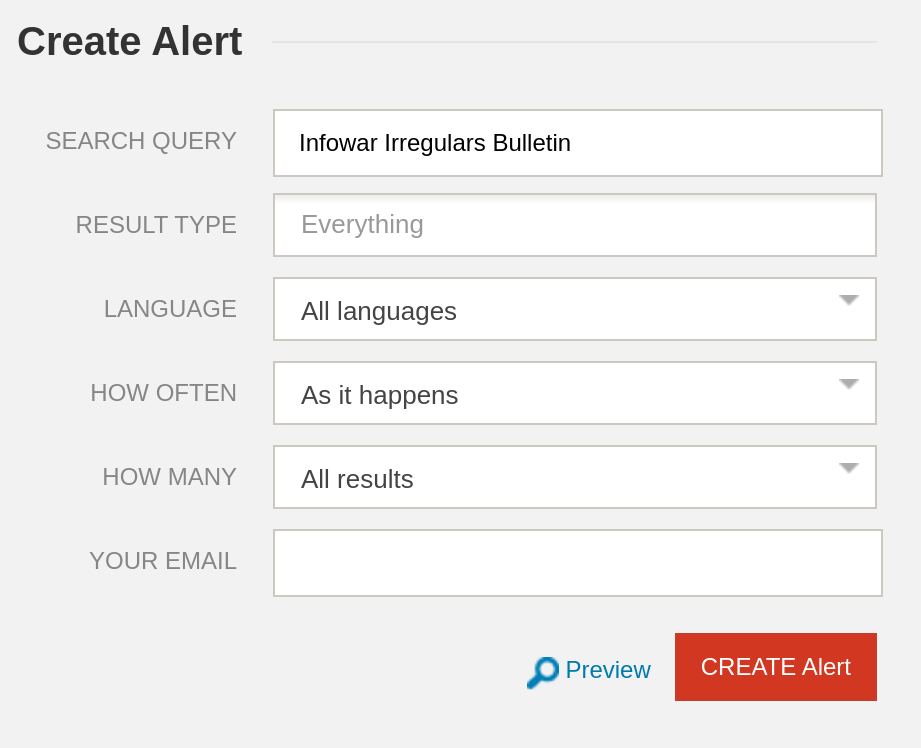
A few days ago in Situational Awareness I mentioned a set of tools that work well as a basic observation environment, a sort of digital trail cam you can use to keep an eye on things, without constant manual review. Today we’re going to set this tool up, but first let’s cover the “So what” aspect of this task.
Many of us get our news in an aggregated form via a venue that’s mediated by an opaque algorithm that exists to keep us clicking for the benefit of the site, rather than serving our needs. These algorithms were created employing methods borrowed from Las Vegas rather than Langley. They offer a variable payout, slot machine style. You wade through a lot of junk to get a few wins. Every single site wants to show you notifications, another sort of variable payout, and those notifications very often employ the color red – meaning to draw your eye, to pull you back into doing their bidding.
Vegas can only tap your emotional reaction to a win/loss ratio. Algorithms seek to hold your attention by making you angry. YouTube is the poster child for this. I employ one browser extension to block their ads and another to outright ban channels that displease me. My news sources are things like Reuters and CNN, Canada’s CBC, BBC, France24, Germany’s DW. I have banned every right wing fringe site they’ve offered, because I want news, not editorial, not spin. I wouldn’t swim laps in a sewage lagoon and I won’t tolerate Steve Bannon’s Flood The Zone With Shit.
I really hope you do this, spending an hour to get this set up. If you do the following benefits will accrue:
You will have a news environment that you control, not one that seeks to control you.
You will capture feeds that are low volume or irregular so they don’t get lost in the noise.
Appearance of keywords important to you will be captured as they happen, requiring only the time to configure them, rather than daily Google dives.
You will have organized access to the flow of “cognitive excess” available via Substack and similar venues.
Attention Conservation Notice: Adult learners seek a return on their time investment. If you spend an hour today, I think you’ll find that you’re getting back at least an hour a week, perhaps even as much as an hour a day. If you’re already well equipped in this area, you can skip this one.
Inoreader Itself:
I like Inoreader for several reasons, but you can substitute another RSS reader and accomplish much of the same effect. I serve as a sort of “digital quartermaster”, so I’m never just picking tools for me, I take into account that I will need to support others. I’ve heard people speak sadly about the demise of Google Reader, and positively about Feedly as an alternative RSS reader. That being said, this is why I stick to Inoreader.
Works on Android, iPhone, and web interface.
Collects much more than just RSS feeds.
Has internal filtering and forward capabilities.
Offers integration to a dozen other services.
Inoreader does RSS, Google News, Facebook pages, Reddit, Telelgram, and I just realized while writing this that it’s got an aggregation feature for email newsletters.
Not only do you need to go to Inoreader and create a free account, I know there are browser extentions for Chrome and Firefox, and I assume other browsers will have this as well. Here is what I see with Inoreader when I click the extension icon on my Substack:
As you visit your normal news sources the extension icon will change from blue to orange for sites that offer an RSS feed and you can easily add them.
Talkwalker Alerts:
The marvelous Alerts service that Talkwalker offers goes hand in hand with Inoreader for anything I do. I have “my” Inoreader setup, it’s in my desktop’s browser, on an Android tablet that is often found in a gooseneck holder mounted one the headboard of my bed, but that’s mine, it’s not project monitoring.
When I have some area that needs long term attention it gets a setup all its own. I make a Gmail account, a ProtonMail, an Inoreader account, a Talkwalker Alerts setup for one or both of the emails, and then a Dropbox account if I’ve upgraded to Inoreader Pro. Among the Pro integrations is the ability to turn articles meeting certain criteria into PDFs and automatically stashing them in Dropbox. You could do this with Google Drive as well, but recall earlier when I said I expect to support others? Dropbox works well for Linux, Google Drive is a hassle.
Like Inoreader, you get up to fifty alerts on a free Talkwalker account. They offer some nice control knobs – you can select source types, languages, get them in a daily summary or as it happens, and the “How Many” option lets you disable their junk filter, which is useful for spotting SEO efforts.
Conclusion:
If you don’t already have an algorithm free method for accumulating news, the combination of Inoreader and friends is a good place to start.
That’s it, that’s the post. Why don’t you leave a comment once you’ve got your setup in place, so we can move on to applying it to various problems?





